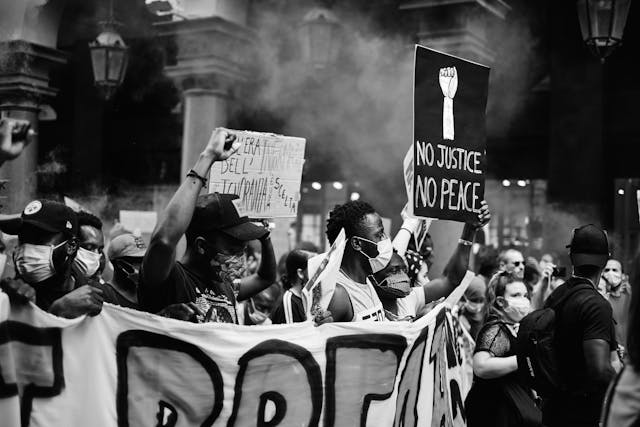Black Alliance for Peace hypocritical unpacks contradictions, radical insights, and depth, delivering a candid, bold investigation.
When the phrase “Black Alliance for Peace hypocritical” hits the air, it sticks like a thorn. Not because it’s polite or neutral, but because it dares to challenge a movement that wraps itself in the cloth of justice and anti-imperialism. That friction, between what’s said and what’s done, is the heart of this exploration, examining movements that challenge justice requires us to look beyond surface proclamations to underlying actions and contradictions.
This isn’t a piece about hollow slogans or stale political chatter. This is an unflinching dive into contradictions, blind spots, and the jagged edges of a movement that often commands respect yet draws suspicion for the same reasons. Here, every sentence earns its place, every angle is sharp, and no fluff hides the cracks.
What You'll Discover:
The Promise of the Black Alliance for Peace
The Black Alliance for Peace (BAP) was born out of necessity. Its mission: connect the fight for Black liberation in the United States with global struggles against imperialism, militarization, and capitalist exploitation. On paper, it’s a powerful vision. The rhetoric calls for dismantling wars abroad and resisting domestic oppression at home.
The promise is attractive. Who wouldn’t want a world where justice is consistent, where peace is not just a slogan but an everyday practice? Yet with every promise comes the pressure of accountability. The higher the ideals, the sharper the fall when reality doesn’t match.
Where Hypocrisy Creeps In
Selective Outrage
Critics argue that BAP often directs its fury toward U.S. imperialism, but hesitates when allies engage in similar behavior. The energy for condemning Western interventions is fierce, yet comparable silence appears when non-Western partners flex military power or engage in questionable practices. Consistency falters.
Global Over Local
While global solidarity is a noble goal, the streets at home still bleed. Many point out how BAP sometimes prioritizes anti-war discourse abroad while underemphasizing urgent local crises, housing injustice, systemic poverty, or day-to-day police violence in Black neighborhoods. If peace is universal, why does the spotlight dim on home soil?
The Money Factor
Movements cost money. Grants, partnerships, and funding streams inevitably enter the picture. Yet money carries fingerprints. If funds come from institutions tied to systemic inequities, how does that square with radical independence? Critics argue that this isn’t transparency, it’s compromise hiding under rhetoric.
How It Feels on the Ground
Grassroots Organizers’ View
Local activists often feel abandoned when the lofty language of international solidarity doesn’t translate into community protection. The critique is sharp: how can you fight drones overseas while ignoring eviction notices next door? To those on the ground, hypocrisy feels less like an intellectual critique and more like betrayal.
Scholars’ Take
Academics frame the problem differently. They see BAP as stuck in theoretical towers, more comfortable issuing press statements than confronting messy, local realities. Hypocrisy, in their view, isn’t about intent, it’s about failure to integrate theory into practice.
What Hypocrisy Costs Movements
- Credibility Loss – When contradictions mount, outsiders stop listening, and insiders stop believing.
- Fractured Coalitions – Allies splinter when the message feels inconsistent or compromised.
- Movement Fatigue – Volunteers and supporters burn out when ideals feel like theater instead of action.
A Radical Model for Consistent Peace
If hypocrisy haunts movements, the solution isn’t silence, it’s reinvention. Imagine a model that refuses to bend when convenience knocks.
Equal Accountability
A bombing abroad and a police shooting at home should provoke the same moral urgency. Both are lives lost to violence. Both demand outrage. Both deserve clarity.
Transparent Funding
Instead of quietly taking institutional money, imagine BAP publishing open ledgers: who funds them, under what terms, and how those funds are used. That act alone could flip the script on accusations of hypocrisy.
Domestic–Global Dual Focus
What if campaigns were designed in twos? One targeting militarization in local police departments, the other targeting U.S. foreign military interventions. The synergy would not only be symbolic but practical, weaving together the struggles of Ferguson and Fallujah into one movement for peace.
Honest Self-Checkpoints
Every six months, the movement could publicly assess itself: where it fell short, where hypocrisy crept in, and how corrections are being made. Instead of running from critique, it would weaponize transparency as strength.
A Hypothetical Mirror: Silence Speaks Loud
Picture this: a child in Gaza killed by a drone strike. A child in Baltimore killed by police gunfire. Both deaths are state violence. If BAP issues a fiery statement for one but stays silent on the other, hypocrisy doesn’t have to be shouted, it whispers itself into existence.
The silence becomes louder than the slogans. The contradiction is felt in every corner of the community.
The Human Dimension of Hypocrisy
Think of it this way: you walk through a park where children play under a mural painted with the words “Peace Everywhere.” The mural is bold, the message inspiring. But just blocks away, police SUVs stalk the streets, sirens scream, and mothers weep for their sons. The mural doesn’t erase the contradiction, it intensifies it.
That’s how hypocrisy feels in real life. Not abstract. Not academic. Tangible. Like nails scratching concrete.
Why Consistency is Non-Negotiable
- Trust anchors movements. When rhetoric matches action, people believe. When it doesn’t, suspicion replaces solidarity.
- Moral clarity fuels longevity. A movement that bends in complexity eventually breaks.
- Solidarity requires symmetry. Justice abroad without justice at home is half a victory that tastes like defeat.
Beyond “Hypocritical”: A Call to Elevate
Labeling BAP hypocritical shouldn’t be the end of the conversation. It should be the spark. Every movement stumbles. Hypocrisy doesn’t need to be an indictment, it can be a checkpoint. The real question is: do you lean into the contradiction, expose it, and grow from it? Or do you bury it under slogans until trust evaporates?
Key Takings
- The phrase “Black Alliance for Peace hypocritical” reflects contradictions between rhetoric and reality.
- Selective outrage undermines credibility; peace must be consistent across domestic and global struggles.
- Funding transparency and self-accountability can neutralize hypocrisy before it festers.
- Hypocrisy damages movements by eroding trust, fracturing coalitions, and exhausting volunteers.
- A dual-focus model, local and global, can weave consistency into the fabric of activism.
- Silence in the face of local injustice is as loud as any speech; hypocrisy thrives where statements stop.
- Criticism doesn’t need to cancel a movement, it can propel it toward radical consistency.
Additional Resources:
- Human Rights Watch Militarization of Policing: A sharp analysis of how police forces adopt war tactics in everyday neighborhoods.
- Amnesty International Building Pathways to Global Peace: A global perspective on dismantling violence and constructing sustainable peace.





